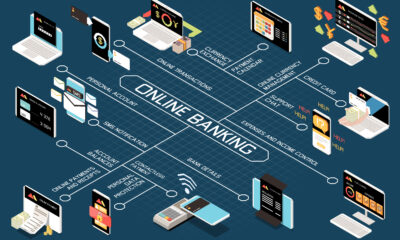Financial News
Trusted Partnership: CBD Offers Easy access to Banking Transactions and Services for UAE SMEs
Commercial Bank of Dubai (CBD) is a UAE-based banking and financial services corporation headquartered in Dubai. CBD is ranked as the number one bank in the UAE on the Forbes list of World’s Best Banks 2022. Amit Malhotra, General Manager – Personal Banking Group, at CBD speaks about the bank’s relationship with SMEs and specific products.
What role the CBD, as one of the longest established banks in the country, has played in helping SMEs to grow and thrive?
As a financial solution provider, we firmly believe in backing our customer’s ambitions. At CBD, we recognize that SMEs are the backbone of the UAE’s economy, accounting for around 94 percent of businesses in the country and they must get the right support to grow and expand their businesses.
As one of the first and most reputed banks in the UAE, CBD has always differentiated itself from the other competitors by truly being a bank focused on family-owned and managed businesses across the Emirates in the UAE. Over the years, it has supported numerous small and medium enterprises that have later grown with us to become large corporates.
Further, we have partnered with several government entities such as the Dubai Economic Department and Free zones such as JAFZA, DMCC, DCAA, and RAKEZ to offer a full suite of products that are specially tailored for the SME segment to fulfill their business requirements and back their ambitions.
What are the business solutions you offer for newly onboarded SMEs at CBD?
CBD provides SMEs with a wide range of solutions. We offer instant digital business accounts through our state-of-art, CBD Rise Digital account opening platform enabling SMEs to get access to banking transactions and services instantly. The digital business account offers attractive features such as no minimum balance requirement and a choice of six account currency denominations, as well as a complimentary business debit card with high daily cash withdrawal limits.
We offer SMEs fast and easy access to secured business loans and a wide array of financing solutions that suit their business needs. Our SME customers can avail of competitive rates on money transfers, remittances, and foreign currency exchange.
CBD also provides SMEs with experienced business banking relationship managers to provide them with the required advice, guidance, and individual client support.
Give us some insight into other business financing services you offer and their eligibility criteria
CBD provides SMEs with a comprehensive portfolio of financing solutions that include regular working capital facilities, collateral-free business term loans, business credit cards, overdrafts, and lots more.
Our business term loan is an award-winning product, which offers an advisory tool that helps SMEs manage their finances and supports their business growth through a customized business finance package. It combines purpose-specific business products which allows them to better manage their business growth efficiently, thus saving time and money by applying for one comprehensive and affordable solution instead of multiple loan facilities.
We offer SMEs market-leading financing facilities with high loan amounts, flexible repayment options, low-interest rates, and fast approvals granted within 48 hours of the application’s submission. Our facilities also include quick business loans for retailers and online trading and service sector businesses against their point of sale (POS) machines’ proceeds which can be easily repaid through monthly installments of sales proceeds collected from the POS machines.
Tell us a bit about the next few years’ growth prospects of SMEs in the UAE
After facing unprecedented challenges in the wake of the Covid-19 pandemic, 88% of SMEs in the UAE are optimistic about the next 12 months, according to the latest research study conducted by MasterCard, published in the 2021 Mastercard Economic Outlook.
The study also showed that 73% of UAE consumers are shopping more online than they did since the start of the pandemic and 97% of UAE shoppers would consider making a purchase with an emerging payment technology over the next year.
CBD has been pioneering this digital transformation and provides its customers with a wide range of digital tools that enable them to accept online payments as well as accept payments through POS and is well-positioned to meet the evolving digital needs of consumers.
In line with our purpose to back the nation’s ambitions, we will continue to support our SME customers, ensuring they get access to the financial and banking products they require to set up and grow their businesses.
Any new product or service initiated by CBD to grow its SME sector engagements
CBD launched its unique digital instant business account for SME customers through the CBD Rise Digital platform, offering four feature-rich business bank account packages that are not only value-packed but also designed to meet customers’ everyday banking needs and deliver a better banking experience.
CBD offers exclusive financing facilities, including unsecured loans of up to AED 2 million, with flexible repayment options of up to 48 months, low-interest rates, and fast approvals granted within 48 hours of the application’s submission. The benefits also include quick business loans for retailers and online trading and service sector businesses against their POS proceeds, with finance amounts up to AED 1 million. The loan payments can be easily repaid through monthly installments of sales proceeds collected from the points of sale.
SME customers can avail of CBD business credit cards with features that meet their personal and business needs such as free for life cards with credit limits of up to AED 250,000, a cash advance facility of up to 50% of the credit limit for urgent expenses, access to a flexible line of revolving credit and more.
Financial
RISK, RESILIENCE AND A 96 PERCENT: WHAT ACCA’S TOUGHEST PAPER TAUGHT ME ABOUT STRATEGY

Advanced Financial Management is a paper that separates theoretical knowledge from applied thinking. It tests your ability to make strategic decisions under uncertainty, weighs competing risks in real time, and defends your reasoning when there is not one right answer. The pass rates reflect that difficulty. When I sat for the exam, World Rank 1 was never the target, surviving the paper with credibility was. I scored 96 out of 100. But the number, on its own, tells you very little. What matters is what the journey demanded: a complete rewiring of how I approached preparation, pressure, and failure.
Treating preparation like a financial model
Early on, I made a decision that changed everything: I would stop following a generic study plan. Instead, I approached my preparation the way an analyst might approach a sensitivity analysis. I tested variables by studying at different times of the day, experimenting with visual mapping versus deep reading. Each iteration helped me identify what produced the best results for my learning style.
This was about precision, not volume. In finance, we talk about capital allocation, where you deploy resources matters more than the sheer amount available. I applied the same logic to my time. High-yield areas got the most attention. Weak spots got targeted effort. Comfortable topics got less.
Strategy is not a luxury reserved for boardrooms. It belongs in every decision you make.
The negative cash flow phase
There is a phase in every long-term project, financial or otherwise, where the output does not match the input. In corporate finance, we call this negative cash flow. You are investing, and the returns have not materialised yet.
My first few weeks of AFM preparation felt exactly like that. I was putting in the hours, but comprehension was patchy. It would have been easy to panic or abandon ship for a different approach.
Instead, I recognised the phase for what it was: temporary. Every business that reaches breakeven has survived this stage first. I leaned into discomfort, trusted the process, and kept showing up. Slowly, the fog lifted.
That early patience was critical. If I had changed course every time results lagged behind effort, I would never have built the understanding that carried me through the exam.
Discipline over motivation
There is a popular idea that success comes from being motivated. I found the opposite to be true. Motivation is unreliable, it fluctuates with your mood, your energy, a difficult question that throws you off balance.
What carried me was routine. I built a daily structure that operated regardless of how I felt on any given morning. Good days and bad days received the same treatment: sit down, open the material, work through the plan.
During my time at Manipal Academy of Higher Education Dubai, I learned to value consistency over intensity. Resilience, I realised, is not about gritting your teeth and pushing through pain. It is about designing a process robust enough to function even when you are running on empty.
Confronting discomfort deliberately
One of the more counterintuitive lessons AFM taught me was about comfort zones. When preparing for a high-stakes exam, there is a strong temptation to practise what you already understand. You move through questions quickly, confidence builds, and the work feels rewarding.
But that feeling is misleading. The topics I avoided, the ones that made me uneasy, the questions I got wrong repeatedly were precisely where the growth was. I started restructuring my study sessions to front-load the most difficult material. If a topic made me uncomfortable, it went to the top of the list.
Over time, those uncomfortable sessions became the foundation of my exam performance. The questions that would have caught me off guard were the ones I was most prepared for.
Managing pressure, not just content
I remember finishing a mock exam and feeling genuinely defeated. The time pressure had overwhelmed me. I knew the material but knowing the material and performing under timed conditions are two very different skills.
That experience changed my approach. I began treating exam technique as its own discipline, separate from subject knowledge. I practised under strict time limits and developed a method for approaching unfamiliar questions: pause, outline, then write.
On exam day, there were moments where questions looked unfamiliar at first glance. Instead of panicking, I paused, outlined a structure, and worked through each part methodically. I finished on time, with every question addressed.
The real lesson: stress does not disappear because you have prepared well. You simply get better at functioning within it.
Feedback as fuel
A score of 96 percent might suggest a clean, linear path to the top. The reality was messier. Mock results were humbling. Feedback on practice answers was sometimes blunt.
But I made a conscious decision early on, I would treat every piece of critical feedback as information, not as judgement. If a mock answer missed the mark, I wanted to understand why so, to close the gap between where I was and where I needed to be.
That openness to correction was, I believe, one of the most important factors in my result. The students who improve fastest are rarely the most talented. They are the ones willing to be told they are wrong and to adjust accordingly.
Beyond the exam
World Rank 1 was a rewarding outcome. But the rank is a snapshot, a single data point from a single day.
Structured thinking. Disciplined preparation. The ability to remain calm when the stakes are high. A willingness to sit with discomfort rather than avoid it. These are not exam skills. They are life skills.
AFM taught me that risk is not something to fear. It is something to understand, to price, and to manage. That principle holds whether you are valuing a derivative or deciding how to spend your next hour. The same applies to every challenge worth pursuing.
Financial
Abu Dhabi-Based Asif Aziz Will Illuminate London’s West End with Ramadan Lights for Fourth Year, Expanding Global Cultural Impact


Abu Dhabi–based businessman and philanthropist Asif Aziz, Founder of Criterion Capital, continues to set the benchmark for large-scale public programming as his landmark Ramadan Lights London initiative returns for a spectacular fourth edition.
Having launched Western Europe’s first-ever aerial Ramadan lights in 2023, Aziz has permanently reshaped the cultural landscape of London. What began as a groundbreaking concept has since evolved into a globally-recognised, free, annual celebration delivered for civic good, placing the values of Ramadan at the heart of one of the world’s most influential cities.
Delivered through Aziz’s charity, The Aziz Foundation (Registered Charity: 1169558), Ramadan Lights London demonstrates values-led leadership at scale, showing how faith, culture and community can intersect to create lasting social impact.

At the heart of the programme is the flagship aerial lights display along Coventry Street: a pioneering installation of more than 30,000 sustainable LED lights arranged in intricate geometric patterns inspired by Islamic art, with motifs representing suhoor and iftar.
The 2026 programme will open with a high-profile switch-on ceremony, with the lights activated by Sir Sadiq Khan, Mayor of London, Rahima Aziz BEM, Trustee at The Aziz Foundation, and Adil Ray OBE, actor and broadcaster, in the presence of senior public leaders, distinguished cultural figures, ambassadors and international dignitaries. The display will remain illuminated until 18th March 2026, before transitioning to Eid Lights through to 24th March 2026.

A selection of artworks featured in Shared Light – central London’s first interfaith art exhibition. Left: Rooh-e-Bhag (Soul of the Garden) (2025) by Mohamad Aaqib Anvarmia. Centre: Hospitality of Abraham – After Rublev (2025) by Meg Wroe. Right: Mettavihari (2025) by Colin Panrucker
This year will also see the launch of Shared Light – central London’s first interfaith Ramadan art exhibition – bringing together artists of all faiths and backgrounds whose work is inspired by the values of Ramadan. The exhibition will be unveiled by the Deputy Lord Mayor of Westminster and hosted at Aziz’s Zedwell hotel at Piccadilly Circus, reinforcing culture’s role as a bridge between communities in one of the world’s most iconic city centres.

Ramadan Lights London will also welcome back Ramadan Delights, London’s first curated iftar food trail, introduced by Aziz in 2025 and now firmly established as a district-wide West End experience. The trail brings together leading international brands and heritage institutions – including Fortnum & Mason, 1 Leicester Square Rooftop, PizzaExpress and Shake Shack- offering special menus, exclusive offers and halal-friendly dining while supporting local businesses and the economic vitality of the area.
This year, the initiative is further strengthened through a partnership with Centrepoint, the UK’s leading youth homelessness charity, reflecting a shared commitment to social mobility, economic empowerment and supporting disadvantaged young people.
Commenting on the programme, Asif Aziz said: “Ramadan Lights London reflects how the values of Ramadan – generosity, reflection and empathy – can contribute meaningfully to civic life. It is about thoughtful engagement and creating shared experiences that strengthen communities and endure over time.”
Beyond Ramadan Lights London, Aziz’s wider philanthropic work continues to deliver impact. Since 2015, The Aziz Foundation has awarded over 750 scholarships, supported more than 100 media internships, and delivered extensive mentorship programmes across key industries. Aziz is also leading the regeneration of Criterion Capital’s Grade II-listed London Trocadero, transforming the landmark into a 1,000-capacity mosque and community centre – a long-term investment in cultural and faith infrastructure in a major global city.
Alongside his charitable endeavours, Aziz is establishing a scalable, world-class co-investment platform in Abu Dhabi, working with UAE institutions to deploy capital into transformative urban and living-sector opportunities across Europe and the Middle East, with a continued focus on sustainable social outcomes.
Financial
UAE ATTRACTS $40BN IN FDI AMID GLOBAL UNCERTAINTY, NEW REPORT SUPPORTED BY QASHIO REVEALS

As geopolitical tensions, de-globalisation, and economic uncertainty reshape global capital flows, the United Arab Emirates (UAE) is consolidating its position as one of the world’s most trusted and resilient financial gateways, according to a new report by Emerging Markets Intelligence & Research (EMIR), supported by Qashio.
The report, ‘Mapping the UAE’s Role as a Global Financial Gateway’, highlights how the UAE is attracting high levels of foreign direct investment and financial activity at a time when capital is retreating from many traditional markets.
Foreign direct investment into the UAE doubled to $40 billion (between 2019 and 2024), reaching record levels even as global FDI stagnated. In 2024, FDI accounted for 40% of the UAE’s gross capital formation, compared to just 4.3% across developed economies, underscoring the country’s growing role as a destination for long-term, trust-led capital.
The scale of activity is accelerating rapidly. The UAE recorded 1,362 FDI projects in 2024, representing a 350% increase since 2020, while assets under management in the Dubai International Financial Centre (DIFC) reached $700 billion, growing 58% year-on-year.
According to the report, the UAE’s ability to benefit from global realignment is closely linked to its neutrality, regulatory clarity, and institutional agility.
“The UAE is actually benefiting from the de-globalisation and the geopolitical reorientation of major power blocks. It doesn’t have adversaries, so is able to build economic ties with everyone. The speed with which the government has been able to adapt to and anticipate the new situation is remarkable,” the report notes.
Beyond capital inflows, the research also points to the UAE’s expanding role as a transaction and payments hub, supported by modern financial infrastructure, strong compliance frameworks, and growing confidence among global businesses managing cross-border activity from the region.
From Qashio’s perspective, the UAE’s rise as a financial gateway reinforces the importance of secure, transparent, and compliant financial operations for businesses operating in an increasingly complex global environment.
“As capital flows become more fragmented and regulated, trust and control are no longer optional — they are foundational,” said Armin Moradi, Founder and CEO of Qashio. “Businesses operating from the UAE need full visibility over spending, strong compliance with Central Bank guidance, and the ability to act on financial insights in real time. This report reflects why the UAE has earned global confidence — and how organisations can operate responsibly within that ecosystem.”
The findings position the UAE not only as a safe destination for capital, but as a jurisdiction capable of supporting long-term growth across finance, trade, technology, and digital assets — at a time when global businesses are reassessing where and how they deploy resources.
To learn more about how the UAE is consolidating its role as a trusted global financial gateway and what this means for businesses navigating today’s fragmented capital landscape download the full report here.
-

 Tech News2 years ago
Tech News2 years agoDenodo Bolsters Executive Team by Hiring Christophe Culine as its Chief Revenue Officer
-

 VAR10 months ago
VAR10 months agoMicrosoft Launches New Surface Copilot+ PCs for Business
-
News10 years ago
SENDQUICK (TALARIAX) INTRODUCES SQOOPE – THE BREAKTHROUGH IN MOBILE MESSAGING
-

 Tech Interviews2 years ago
Tech Interviews2 years agoNavigating the Cybersecurity Landscape in Hybrid Work Environments
-

 Tech News7 months ago
Tech News7 months agoNothing Launches flagship Nothing Phone (3) and Headphone (1) in theme with the Iconic Museum of the Future in Dubai
-

 VAR1 year ago
VAR1 year agoSamsung Galaxy Z Fold6 vs Google Pixel 9 Pro Fold: Clash Of The Folding Phenoms
-

 Automotive1 year ago
Automotive1 year agoAGMC Launches the RIDDARA RD6 High Performance Fully Electric 4×4 Pickup
-

 Tech News2 years ago
Tech News2 years agoBrighton College Abu Dhabi and Brighton College Al Ain Donate 954 IT Devices in Support of ‘Donate Your Own Device’ Campaign




















